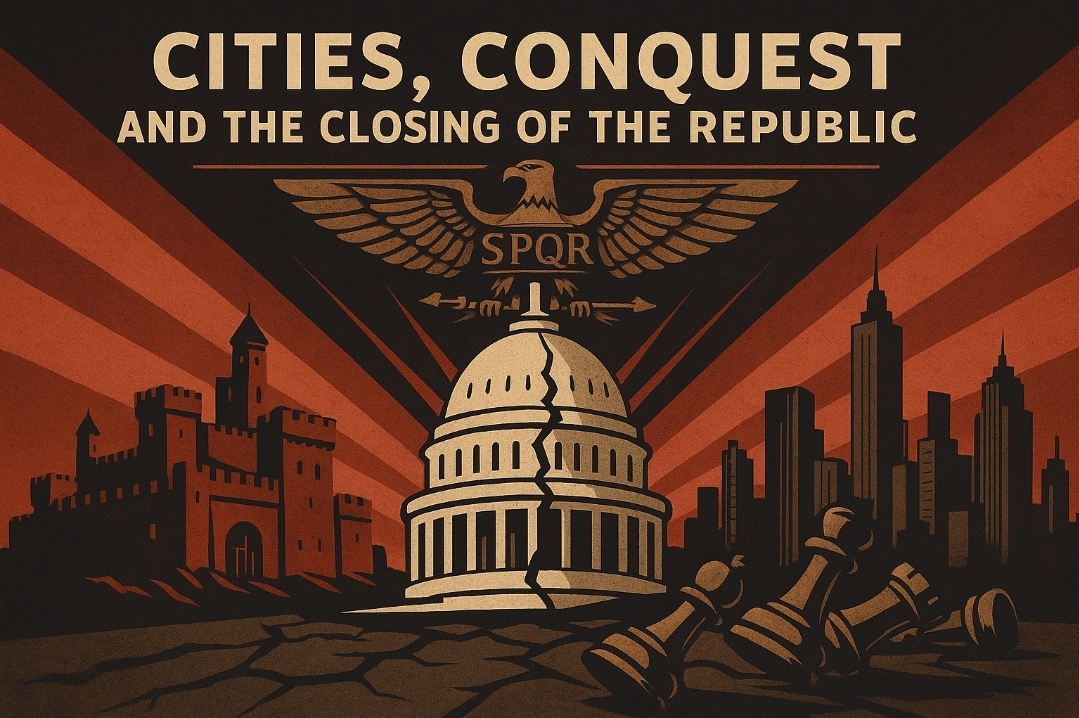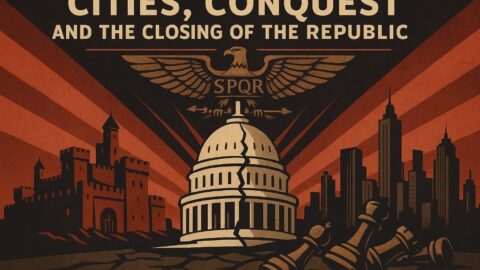Jefferson’s Warnings, Mass Migration, and the New Balkanization of the West
Thomas Jefferson warned that when people are “piled upon one another in large cities,” faction and centralization corrode republican self-government. Two centuries later, mega-metros and mass migration—managed poorly—are accelerating a new balkanization: fragmented enclaves, polarized politics, and policy made by distant blocs rather than local communities. All this is sold as “democracy,” yet it trends toward centralized administrative rule aligned with global finance, corporate platforms, and extra-constitutional networks. The antidote is not xenophobia or nostalgia—it is constitutional federalism, civic integration, and scale-aware reform that restores authority to communities while protecting equal rights under law.
Jefferson’s Geometry of Liberty: Power Must Stay Small and Near
Jefferson’s core design principle was decentralization: disperse authority to counties, towns, and associations close to the people. Large, dense centers tend to:
- Concentrate money and media,
- Breed faction and patronage,
- Pull decision-making upward and inward.
When that happens, citizens become subjects of procedure rather than authors of law.
Conquest Through Migration—When Policy Becomes a Weapon of Scale
Migration per se is not “conquest.” The United States is a nation of immigrants. The risk arises when political and economic actors use migration policy—plus media narratives and funding streams—to:
- Rapidly concentrate population into a few metros without building civic integration (language, law, norms, work),
- Reweight electoral maps via urban super-blocs that then preempt local governance,
- Create administrative dependence (services governed by distant agencies/NGOs), entrenching a permanent managerial class.
The outcome is balkanization: parallel communities with weak shared norms, competing for centralized spoils, policed by platforms and bureaucracies instead of accountable local institutions.
The New Triangle: Cities, Platforms, and Global Capital
Today’s “city bloc” is not just physical—it’s digital and financial:
- Platforms (identity, payments, speech) act as quasi-governments, enforcing rules via terms of service rather than law.
- Global capital steers urban real estate, services, and data markets; local governments become custodians for outside owners.
- Administrative rulemaking (not legislation) sets one-size standards that override towns and counties.
Sold as “democracy,” the system functions as centralized management—the opposite of a republic.
Signs of Balkanization (Without Blaming People)
- Enclave governance: NGOs and donor networks substituting for elected local institutions.
- Language and law fragmentation: weak civic curriculum, uneven enforcement, and parallel information ecosystems.
- Electoral overcentralization: metro coalitions setting statewide policy with little rural or small-city input.
- Service dependency: permanent emergency footing (housing, health, schooling) run by distant agencies rather than community compacts.
These are policy failures, not the fault of families seeking safety and work. Aim the critique at systems, not neighbors.
“Democracy” vs. a Republic: The Branding Switch
Majoritarian branding (“our side has the numbers”) masks a shift from deliberative, layered consent to administrative fiat:
- Emergency orders → permanent standards
- Grants with strings → preemption of local rule
- Platform “safety” policies → private censorship of public debate
When urban majorities plus platforms can impose, the minorities of place (small cities, towns, rural counties) lose republican protections.
Guardrails that Preserve a Republic and Human Dignity
This is not a call to close hearts; it’s a call to rebuild the constitutional architecture that lets diverse people live as one nation.
1) Scale-Conscious Federalism
- Local Veto Windows: Any statewide rule impacting schools, land use, or policing must include a municipal opt-out or negotiated variance.
- Sunset & Re-vote: Emergency and administrative rules expire unless reauthorized after local hearings.
2) Civic Integration That Works
- English-first civic curriculum anchored in the Constitution, common law, and local history; required for all publicly funded programs.
- Work-tied immigration channels with employer bonds and local sponsorship so newcomers are anchored to communities, not bureaucracies.
- Citizen mentors: Faith and civic groups paired with new families for language, law, and livelihood—assimilation by friendship, not propaganda.
3) Electoral Fairness Across Places
- Districting reforms that preserve regional voice (multi-member districts or proportional local representation) so metros don’t erase everyone else.
- County consent for large-scale resettlement and infrastructure that change local demography or costs.
4) End Administrative Preemption by Purse
- Grant Neutrality Act: No federal/state funding may coerce adoption of non-statutory policies (curricula, policing rules, speech codes).
- Reverse-on-Resume rule: Changes adopted during “crises” auto-revert unless the legislature re-passes them after public debate.
5) Platform Neutrality for Core Civic Functions
- Treat dominant digital rails (ID, payments, core speech carriage) as common carriers: transparent rules, due process, viewpoint neutrality.
- Data portability so communities aren’t captive to a single platform’s political preferences.
6) Housing & Work that Build Stake, Not Serfdom
- Zoning liberalization for starter homes and small rentals; favor ownership over perpetual tenancy.
- Main-street capital (credit unions, co-ops, local procurement) to integrate newcomers into real economies, not permanent aid.
Metrics for Leaders (and Voters)
- Civic integration rate: language + employment + local association membership within 24 months.
- Local authority index: share of budget and policy decided within the county/city.
- Preemption load: number of mandates towns must obey without statutory vote.
- Platform due-process score: notice, evidence access, appeal timelines for civic speech restrictions.
- Housing stake: % households (native-born and immigrant) with some equity.
If these numbers aren’t rising, you’re not strengthening a republic—you’re managing a holding pen.
A Moral North Star
A just republic honors the image of God in every person and guards liberty by limiting power. That means:
- Welcoming the stranger into a shared law and language, not into permanent separation;
- Protecting minorities of place and conscience, not just minorities of category;
- Measuring policies by whether they increase self-government, not just headcounts.
Conclusion: Re-Weaving One People at Human Scale
Jefferson’s warning was never anti-city or anti-immigrant; it was anti-centralization and pro-human scale. Western nations now face a choice: continue down the path of balkanized metros managed by global oligarchs and platform rules—or rebuild a republic of places where authority lives near responsibility, newcomers become neighbors, and “democracy” is more than a slogan.
The work ahead is clear: devolve power, integrate people, open platforms, and bind budgets to local consent. That is how diverse citizens become one nation again—free, accountable, and worthy of the name “republic.”






